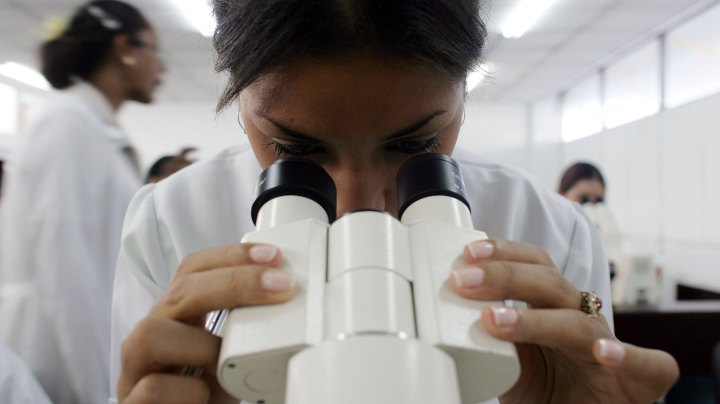Cuba Plays Key Role in Global Scientific Community’s Race to Curb Contagion

Marielys Krystel Dominguez Guerra from Panama looks through a microscope during a class while attending the Latin American School of Medical Sciences December 4, 2006 in Havana, Cuba. Photo by Joe Raedle/Getty Images
One of the things Fidel Castro focused on during his 1959 revolution was health, and many of his efforts included powering a biotech and biopharmaceutical sector that is now proving to have a central, albeit controversial, role in the coronavirus pandemic.
Cuba produces many of its own drugs, among them an antiviral agent called interferon that has caught the eye of China and about 80 other countries that see it as a possible treatment for COVID-19 patients. According to NBC Latino, the Cuban government is hoping that this new interest will boost its economy and make it a player in the global scientific community’s race to curb contagion and death rates.
Still, the use of interferon isn’t without criticism: Some experts have pointed out that it isn’t safe for Cuba to tout it as a treatment when it’s still unproven. Additionally, some forms of interferon can cause side effects, among them fever and respiratory issues. And Cuba isn’t the only place that produces the interferon-alpha-2b agent that has become the topic of international conversation.
However, Cuban government has said the injections have lowered the mortality rate to 4.1%, which NBC Latino points out is still less than the U.S.’ average of 5.9%.

“We have good products like interferon alpha 2b that we are exporting and that open possibilities,” Trade Minister Rodrigo Malmierca said in a recent roundtable press conference.
Cuba has also leveraged its medical workforce and sent doctors and nurses across the world; moves that have been described as an extension of “medical diplomacy.” Photographs of doctors and nurses arriving in Italy circled the Internet, mirroring the way in which Cuba has sent healthcare professionals to areas in need for the last 60 years. However, to some critics, those efforts “shift scrutiny away from its own poor human rights record” and obscure the lack of healthcare available to Cubans within the country.
And yet, Cuba’s professionals may have a role to play here, regardless of criticism around its government. The fight against the coronavirus is a global one, something that should be kept in perspective, particularly as President Trump pushes for America-first policies that could result in heightened competition and worse outcomes at an international level.
